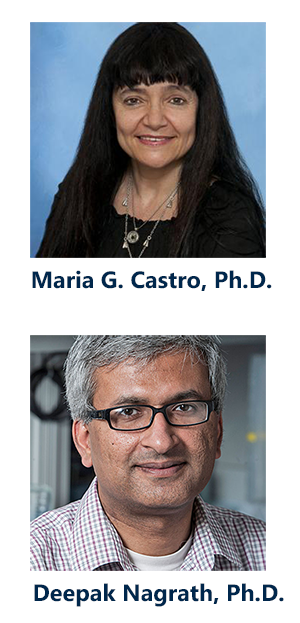Forbes Scholars

The Forbes Scholars initiative offers faculty members throughout the University of Michigan funding for high-risk, high-reward cancer research
Awards focus on faculty dedicated to team science, embodying the ideals of the Forbes Institute for Cancer Discovery. We seek the most dynamic researchers with the boldest ideas from all areas of campus.
The Forbes Scholars program increases the pace with which innovative laboratory discoveries are transformed into new patient treatments, and establishes a university-wide cohort of researchers committed to cancer discovery. The number and types of scholars selected each year varies based on the availability of funds and the applications received.
Introducing the 2020 Senior Forbes Scholars: Maria G. Castro, Ph.D. and Deepak Nagrath, Ph.D.

With one-year grants of $250,000, fully funded by philanthropy, these senior researchers will collaborate across disciplines to pursue life-saving new treatment approaches for brain and ovarian cancers. We appreciate your interest in and support of the Forbes Institute, which aims to advance discoveries toward more effective cancer treatments and cures. Their projects are:
Nano-Carrier-Based Drug Therapy for Glioblastoma
When complete surgical removal of an invasive brain tumor is nearly impossible and the blood-brain barrier protects that tumor from chemotherapy, an innovative treatment approach is urgent. Dr. Castro and a team of researchers from the University of Michigan Medical School and the Department of Engineering are taking on those challenges for glioblastoma, the most prevalent form of brain cancer.
Of the 24,000 adults in the United States diagnosed with glioblastoma each year, many face recurrence and disease progression after surgery, with this highly aggressive cancer taking 18,000 lives. Dr. Castro will leverage her Forbes Institute grant to advance a pioneering drug delivery therapy with the goal of improving those outcomes. The approach uses a nano-carrier to deliver a drug to the brain that shuts down a transcription factor called STAT3, which is critical for the growth of glioblastoma. The drug causes the tumor cells to die -- and trains the patient’s immune system to recognize and kill any tumor cells that remain.
Dr. Castro will be testing the approach in pre-clinical laboratory models of glioblastoma. Since radiation is always used as standard of care for brain cancer, the team will test the nano-carrier in combination with radiation. Additionally, they will test it in combination with medications that block immune checkpoints, which are proteins that keep our body’s immune system in check. This will further boost the therapy’s ability to elicit the immune system’s help in stopping the cancer. The goal of the research is to gather the evidence necessary to obtain FDA approval to implement the therapy with patients to improve prognosis and outcomes.
Dr. Castro is the R. C. Schneider Collegiate Professor of Neurosurgery and a professor of cell and developmental biology. She is collaborating on this research with Pedro Lowenstein, M.D., Ph.D., the Richard C. Schneider Collegiate Professor of Neurosurgery and a professor of cell and developmental biology, and Joerg Lahann, Ph.D., director of the Biointerfaces Institute and professor of chemical engineering, biomedical engineering, materials science and engineering, and macromolecular science and engineering.
Identifying Lethal Metabolic Targets in Ovarian Cancer
As ovarian cancer progresses, cancer cells acquire more and more mutations. Most of these mutations cause the cancer cells to grow and spread, but others cause harm to those cells.
Deepak Nagrath, Ph.D., is using genetic and clinical data from patients to identify mutations in ovarian cancer cells that lead to vulnerabilities in the cells’ engines, or cellular metabolism. His vision is to create a precision health platform that will guide treatment decisions for ovarian cancer. It will enable clinicians to decide which drug will be most suitable for a particular ovarian cancer patient based on the genetic information of each individual patient.
Building on success in developing bioinformatics and machine-learning tools to identify tumor-specific vulnerable targets, Dr. Nagrath, an associate professor of biomedical engineering, is partnering with colleagues in the Department of Pathology — Kathleen Cho, M.D., the Peter A. Ward Professor of Pathology and professor of internal medicine, and Analisa DiFeo, Ph.D., associate professor of pathology and obstetrics and gynecology. The collaborative team will use cell culture, patient samples, and laboratory models to establish the precision medicine framework.
Ovarian cancer causes more deaths each year than any other gynecologic cancer in the United States. In 2016, for every 100,000 women in the United States, 10 new ovarian cancer cases were reported and seven died of cancer, according to the Centers for Disease Control and Prevention.
